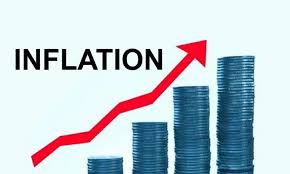…As Sokoto State’s Food Inflation Rises To 51.30%, Highest Nationwide
As the whirlwinds associated with lingering fiscal and monetary measures of the Federal Government continue to take tolls on businesses and consumers’ real incomes, Nigeria’s Headline inflation rate sustained its surging trend in November this year, peaking at 34.60% from the 33.88% in the preceding month.
The National Bureau of Statistics (NBS) on Monday reported that the November 2024 Headline inflation rate showed an increase of 0.72% points compared to the October 2024 Headline inflation rate.
In its ‘Consumer Price Index and Inflation’ report published on its website, the statistics agency disclosed that when analysed on a year-on-year basis, the November inflation rate was 6.40% points higher than the 28.20% rate recorded in November 2023.
It, however, clarified that on a month-on-month basis, the Headline inflation rate in month under review was 2.638%, which was 0.002% points lower than the 2.640% rate recorded in October 2024, implying that in November 2024, the rate of increase in the average price level is slightly lower than the rate of increase in the average price level in the preceding month.
The Bureau indicated that in November this year, the Urban inflation rate was 37.10%, 6.88% points higher compared to the 30.21% recorded in November 2023, adding that on a month-on-month basis, the Urban inflation rate was 2.77% in November 2024, representing 0.02% points higher compared to the 2.75% rate recorded in October 2024.
It added that the twelve-month average for the Urban inflation rate was 35.07% in November 2024, which also reflected 9.62% points higher than the 25.45% rate reported in the corresponding month of last year.
On the Rural inflation rate trend, the report showed that the rate increased to 32.27% on a year-on-year basis in November 2024, which reflected a 5.84% points higher compared to the 26.43% recorded in November 2023; adding that on a month-on-month basis, the Rural inflation rate in the month under review was 2.51%, down by 0.02% points compared to October 2024
Also, the data in the report revealed that the corresponding twelve-month average for the Rural inflation rate in November 2024 was 30.71%, which was 8.00% points higher compared to the 22.71% recorded in the corresponding month of last year.
According to the statistics agency, in November this year the Food inflation rate rose to 39.93% on a year-on-year basis, reflecting 7.08% points increase than the 32.84% rate recorded in the corresponfing month of last year.
It attributed the increase in the Food inflation rate on a year-on-year basis to increases in prices of the following items; Yam, Water Yam, Coco Yam, etc (Potatoes, Yam & Other Tubers Class), Guinea Corn, Maize Grains, Rice, etc (Bread and Cereals Class), Beer, Pinto (Tobacco Class), and Palm Oil, Vegetable Oil, etc (Oil and Fats Class).
The report revealed that on a month-on-month basis, the Food inflation rate in November 2024 was 2.98%, which shows 0.05% points increase compared to the rate recorded in October 2024 (2.94%), due to increase in the average prices of Mudfish, Catfish Dried, Dried Fish Sadine, etc (Fish Class), Rice, Yam Flour, Millet Whole grain, Corn flour, etc (Bread and Cereals Class), Agric Egg, Powered Milk, Fresh Milk, etc (Milk, cheese and eggs Class) and Dried Beef, Goat Meat, Frozen Chicken, etc (Meat Class)
The Bureau reported that average annual rate of Food inflation for the twelve months ending November 2024 over the previous twelve-month average was 38.67%, which was 11.58% points higher compared with the average annual rate of change recorded in November 2023 (27.09%).
A further analysis of the report’s data indicated that the “All Items less Farm Produces and Energy” or Core inflation, which excludes the prices of volatile agricultural produces and energy stood at 28.75% in November 2024 on a year-on-year basis; showing an increase of 6.36% points when compared to the 22.38% recorded in November 2023.
The Bureau disclosed that the highest increases were recorded in prices of the following items; Taxi journey per drop, Bus journey intercity, Journey by motorcycle, etc (under Passenger Transport by Road Class), Rents (Actual and Imputed Rentals for Housing Class), Meal at a local Restaurant (Accommodation Service Class), and hair cut service, women’s hairdressing, etc (Hairdressing salons & personal grooming establishments Class).
It added that on a month-on-month basis, the Core Inflation rate was 1.83% in November this year compared to 2.14% recorded in the preceding month , showing 0.30% points decline, while the average twelve-month annual inflation rate rose 26.64% for the twelve months ending November 2024, higher by 6.29% points higher than the 20.35% rate recorded in November 2023.
A further decomposition of the CPI and Inflation report on state profiles revealed that across the 36 states and the Federal Capital Territory (FCT), which have different consumption expenditure patterns, in November 2024, All Items inflation rate on a year-on-year basis was highest in Bauchi State (46.21%) followed by Kebbi (42.41%), Anambra (40.48%), while Delta (27.47%), Benue (28.98%), and Katsina with 29.57% recorded the lowest rise in the month under review.
On a month-on-month basis, however, the highest increases in All Items inflation rate was lowest in Yobe (5.14%), Kebbi (5.10%), Kano (4.88%), while Adamawa (0.95%), Osun (1.12%), and Kogi (1.29%) recorded the slowest rise in November this year.
The Food Inflation rate in November 2024 on a year-on-year basis was highest in Sokoto (51.30%), Yobe (49.69%), Edo with 47.77%, while Kwara (31.39%), Kogi (32.95%), and Rivers (33.27%) recorded the slowest rise in Food inflation on Year-on-Year basis.
The Bureau, however, clarified that on a month-on-month basis, in the month under review the Food inflation was highest in Yobe (6.52%), Kano (5.95%), and Kebbi (5.68%) while Borno (0.76%), Adamawa (0.90%) and Kogi (1.21%) recorded the slowest rise.






